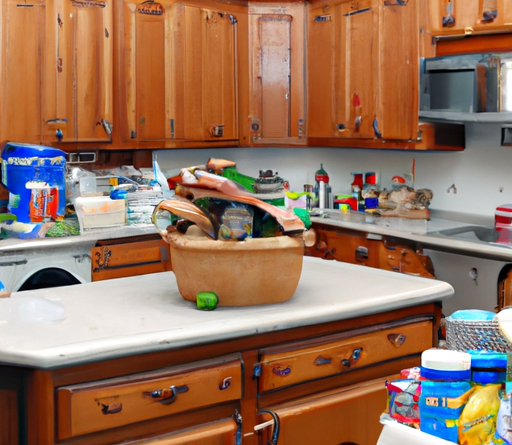Curious about how to determine if your kitchen appliances are consuming excessive amounts of electricity? In this article, we will guide you through some simple ways to gauge the energy usage of your kitchen appliances and provide you with practical tips to conserve energy and lower your electricity bills. Whether it’s your refrigerator, oven, or dishwasher, we’ve got you covered with useful information to ensure your appliances are running efficiently. So, let’s embark on this energy-saving journey and take charge of our kitchen’s power consumption.
Understanding Energy Usage
When it comes to understanding energy usage, it’s important to start with electricity consumption. By knowing how much electricity you are using, you can make informed decisions about energy efficiency and identify any high energy-consuming appliances in your home.
Understanding electricity consumption
Electricity consumption refers to the amount of electricity that is used over a given period of time. This is measured in kilowatt-hours (kWh) and is typically reflected in your utility bills. Understanding your electricity consumption can help you identify any patterns or trends in your energy usage, allowing you to make adjustments accordingly.
Determining energy efficiency ratings
Energy efficiency ratings are a useful tool for identifying the energy consumption of appliances. These ratings are typically displayed on product labels and provide information on how much energy an appliance uses compared to similar models. By choosing appliances with higher energy efficiency ratings, you can reduce your overall energy consumption and save on your utility bills.
Identifying high energy-consuming appliances
It’s important to be able to identify any appliances in your home that are consuming a significant amount of energy. This can help you prioritize which appliances to replace or modify in order to reduce your energy usage. Some common high energy-consuming appliances include refrigerators, air conditioners, water heaters, and washing machines.
Monitoring Electricity Consumption
Monitoring your electricity consumption is a key step in managing your energy usage effectively. By keeping track of how much electricity you are using, you can identify any areas where you may be able to make improvements and reduce your overall energy consumption.
Using an energy monitor
An energy monitor is a device that allows you to track your electricity usage in real-time. These monitors are typically plugged into an electrical outlet and provide you with instant feedback on how much electricity is being used. By using an energy monitor, you can become more aware of your energy consumption habits and make adjustments as necessary.
Reading the smart meter
If you have a smart meter installed in your home, you can easily monitor your electricity consumption by reading the meter readings. Smart meters provide accurate and up-to-date information on your energy usage, allowing you to keep track of your electricity consumption on a regular basis. By understanding your smart meter readings, you can identify any spikes or changes in your energy usage and take action accordingly.
Analyzing utility bills
Another way to monitor your electricity consumption is by analyzing your utility bills. Utility bills typically provide information on your monthly energy usage and costs, allowing you to track your consumption over time. By reviewing your utility bills, you can identify any patterns or trends in your energy usage and make adjustments as needed.

Measuring Appliance Power Usage
To understand which appliances are using the most electricity, it’s important to measure their power usage. This can be done using a watt meter or by calculating power consumption manually.
Using a watt meter
A watt meter is a handy device that allows you to measure the power usage of individual appliances. By plugging an appliance into the watt meter, you can see how much power it consumes in real-time. This can help you identify any energy-hungry appliances in your home and take steps to reduce their usage.
Calculating power consumption manually
If you don’t have access to a watt meter, you can still calculate the power consumption of your appliances manually. This involves checking the appliance’s specifications for information such as the voltage and current it uses. By multiplying the voltage and current, you can calculate the power consumption in watts. This method may be more time-consuming but can still provide valuable insights into the energy usage of your appliances.
Identifying Energy-Efficient Appliances
Choosing energy-efficient appliances is an essential part of reducing energy consumption in your home. By selecting appliances with high energy efficiency ratings, you can minimize your electricity usage and save on your energy bills.
Looking for ENERGY STAR certification
One way to identify energy-efficient appliances is by looking for the ENERGY STAR certification. Appliances that have earned this certification meet strict energy efficiency criteria set by the U.S. Environmental Protection Agency. The ENERGY STAR label can be found on a variety of appliances, including refrigerators, dishwashers, and washing machines.
Checking appliance labels
Appliance labels provide valuable information about the energy consumption of a particular appliance. Look for labels that display the appliance’s energy efficiency rating, which is typically represented by a scale or color-coded system. This rating allows you to compare the energy efficiency of different models and choose the most efficient option.
Considering appliance age
An appliance’s age can also be an indicator of its energy efficiency. Older appliances may not have the same energy-saving features and technology as newer models. By replacing older, less efficient appliances with newer ones, you can significantly reduce your energy usage and save on your utility bills in the long run.

Performing Energy Audits
Energy audits are a useful way to assess your home’s overall energy usage and identify areas for improvement. They can be conducted by professionals or done as a do-it-yourself (DIY) project.
Hiring a professional energy auditor
If you want a comprehensive assessment of your home’s energy usage, hiring a professional energy auditor can provide valuable insights. Energy auditors have the expertise and tools to conduct a thorough evaluation of your home’s energy efficiency, including inspecting insulation, identifying air leaks, and assessing the performance of appliances. They can then recommend specific measures to improve energy efficiency and reduce energy consumption.
Conducting a DIY energy audit
If you prefer a more hands-on approach, you can conduct a DIY energy audit. Start by inspecting your home for areas where energy may be wasted, such as drafty windows or doors, poorly insulated walls, or leaky ductwork. You can also use tools such as thermal cameras or infrared thermometers to identify areas of heat loss. Additionally, you can assess the energy usage of your appliances and lighting fixtures and make adjustments as needed.
Identifying Signs of High Energy Usage
There are several indicators that can signal high energy usage in your home. By recognizing these signs, you can take action to address any energy inefficiencies and reduce your electricity consumption.
Sudden increase in utility bills
One of the most noticeable signs of high energy usage is a sudden increase in your utility bills. If you see a significant spike in your energy costs without any corresponding changes in your usage habits, it may be a sign that there is an energy efficiency issue in your home. Take the time to investigate the potential causes and make any necessary adjustments.
Frequent circuit breaker trips
If your circuit breaker is frequently tripping, it may be a sign that you have appliances or systems that are drawing too much power. When your circuit breaker trips, it is a safety mechanism that prevents overload and potential electrical hazards. Identifying the appliances or systems that are causing the trips can help you address any energy inefficiencies and prevent further issues.
Overheating appliances
Appliances that become excessively hot during use can indicate that they are consuming more energy than necessary. This can be particularly evident with older appliances or those that require regular maintenance. If you notice that your appliances are consistently overheating, it may be worth considering upgrading to more energy-efficient models.

Maximizing Appliance Efficiency
To maximize the efficiency of your appliances and reduce energy consumption, there are several practices you can implement.
Regular maintenance and cleaning
Routine maintenance and cleaning of your appliances can ensure that they are operating at their optimal efficiency. This includes tasks such as cleaning or replacing filters, descaling appliances, and checking for any leaks or malfunctions. By keeping your appliances in good condition, you can reduce energy waste and extend their lifespan.
Proper loading and usage
Using your appliances efficiently can also help minimize energy usage. For example, properly loading your dishwasher or washing machine to ensure that they are running at full capacity can maximize their efficiency. Similarly, using your oven and stove wisely by preheating only when necessary and using the appropriate size burner or pot can help conserve energy.
Consideration of standby power
Many appliances continue to consume energy even when they are not in use, a phenomenon known as standby power. By unplugging appliances or using power strips with on/off switches, you can easily cut off the power supply to these devices when they are not needed. This simple action can help eliminate unnecessary energy consumption and reduce your electricity usage.
Utilizing Energy-Saving Tips
In addition to maximizing appliance efficiency, there are several energy-saving tips that you can implement in your daily routine to reduce your overall energy consumption.
Using energy-saving settings
Many appliances, such as televisions, computers, and even some kitchen appliances, have energy-saving settings that can be activated. These settings typically reduce power consumption by adjusting brightness levels, using sleep modes, or turning off automatically after a certain period of inactivity. Taking advantage of these energy-saving features can make a significant difference in your overall energy usage.
Adjusting refrigerator and freezer temperatures
Refrigerators and freezers are essential appliances in any kitchen, but they can also be energy-intensive. By ensuring that your refrigerator and freezer are set to the appropriate temperatures (between 37-40°F for the refrigerator and 0-5°F for the freezer), you can optimize their energy efficiency. Additionally, avoiding frequent opening and closing of the refrigerator door can help reduce energy waste.
Making efficient cooking choices
When it comes to cooking, there are several energy-saving choices you can make. Using the appropriate size burner or pot on your stove, covering pots and pans while cooking, and using the residual heat on your stove to finish cooking can all help reduce energy consumption. Additionally, utilizing small kitchen appliances such as toaster ovens or slow cookers when appropriate can be more energy-efficient than using a full-size oven.
Investing in Energy Monitoring Tools
To track your energy usage more effectively, you may want to consider investing in energy monitoring tools. These tools can provide real-time data on your energy consumption and help you identify areas where you can make improvements.
Smart plugs and outlets
Smart plugs and outlets allow you to control the power supply to your appliances remotely. By connecting your appliances to these devices, you can monitor their energy usage, set timers, and even turn them off when not in use. Some smart plugs and outlets also provide energy consumption data, allowing you to track and analyze your usage over time.
Smart home energy management systems
Smart home energy management systems offer a more comprehensive approach to monitoring and managing your energy usage. These systems typically include sensors and software that collect data on your energy consumption from various sources, such as appliances, lighting, and heating systems. They provide detailed insights and recommendations for optimizing your energy efficiency and often allow for remote control and automation of your home’s energy usage.
Mobile apps for energy tracking
Many utility companies offer mobile apps that allow you to track your energy usage and receive personalized energy efficiency tips. These apps typically sync with your utility account to provide real-time data on your energy consumption and costs. By regularly checking your energy usage through these apps, you can stay informed about your energy consumption patterns and make adjustments as necessary.
Seeking Professional Guidance
If you have concerns about your kitchen appliances or energy consumption, it may be helpful to seek guidance from professionals who specialize in electrical systems and energy efficiency.
Consulting an electrician
An electrician can assess the electrical systems in your home and provide recommendations for improving energy efficiency. They can ensure that your appliances are properly wired and functioning optimally, and can also offer advice on energy-saving technologies and practices.
Reaching out to appliance manufacturers
Appliance manufacturers often provide resources and support for optimizing energy efficiency. If you have specific questions or concerns about the energy consumption of a particular appliance, reaching out to the manufacturer can provide valuable insights and guidance.
In conclusion, understanding energy usage is essential for identifying energy inefficiencies and reducing your electricity consumption. By monitoring your electricity usage, measuring appliance power usage, identifying energy-efficient appliances, performing energy audits, and recognizing signs of high energy usage, you can take steps to maximize appliance efficiency, implement energy-saving tips, and make informed decisions about energy consumption. Utilizing energy monitoring tools and seeking professional guidance can further enhance your efforts to reduce energy usage and promote a more energy-efficient lifestyle. Remember, every small change and improvement can make a big difference in the long run.









